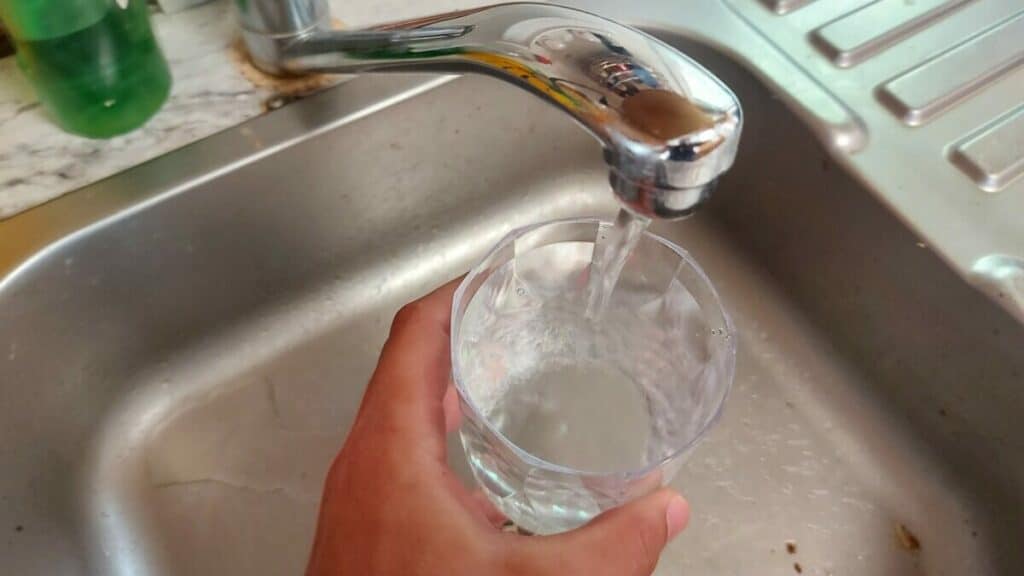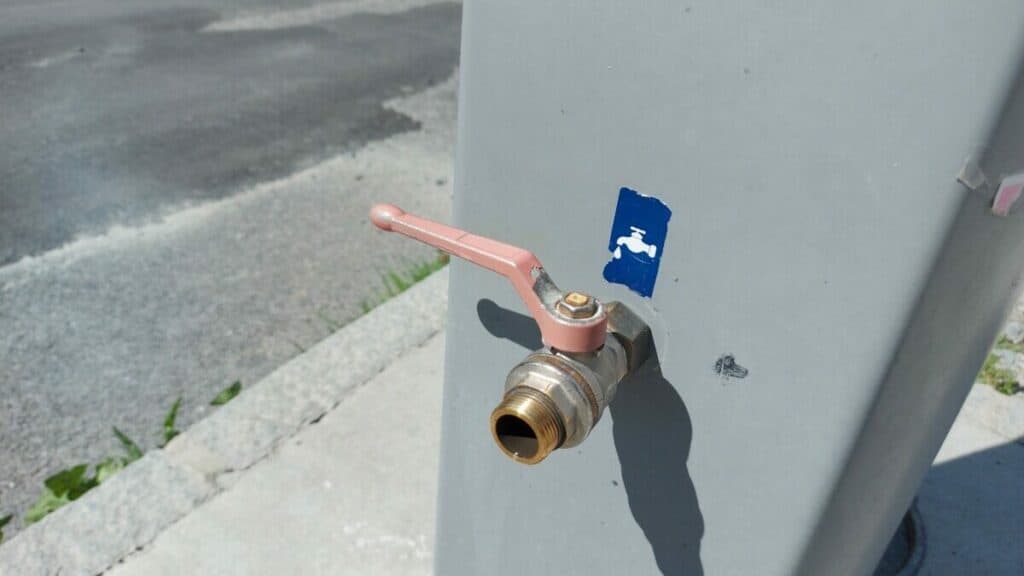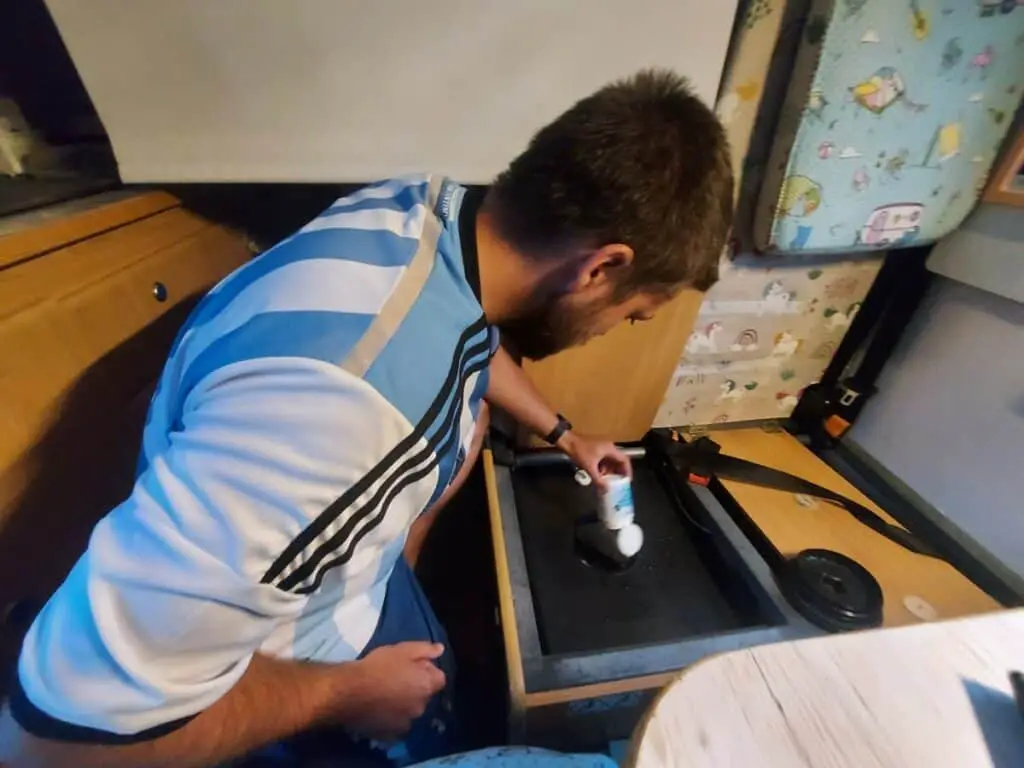This post contains affiliate links (I get a commission at no extra cost to you for purchases made through links in this post).

You give up many creature comforts when you live in a Motorhome, RV, or caravan full-time, but clean water should never, ever be one of them! You’re looking into RV water filters to ensure your water is always potable, but you’re not sure if you need one. Do you?
If you sanitize your water tanks regularly and always refill potable water, you don’t need an RV water filter. An RV water filter is good, especially if you’re dubious about where your water is coming from, but ultimately is optional.
Personally, I’ve drank water from my motorhome’s taps for years without a filter, but then again, I always double-check that the water is clean. That doesn’t mean a water filter won’t come in handy for you. This article will provide information to help you make a purchasing decision (or not!).
How Does an RV Water Filter Work?
According to 2022 stats from water company Aquasana, up to 77 percent of American homeowners use a water filter at home, so it makes sense that this behavior would also carry over to a caravan.
How exactly does an RV water filter work? That depends on the type you choose. Here are the options.
Canister Filter
A versatile type of water filter for motorhomes, the canister filter gets the job done without too many bells and whistles. The water that pumps through your RV enters a canister, which can be standard-sized or jumbo-sized.
The canister catches contaminants and sediments while the clean water continues traveling through your water system and comes out of the taps ready to drink. You have the advantage of outfitting several filter housings with a canister filter, and you can also use various internal filter cartridges.
A standard-sized canister filter is best for those who spend a few weeks or months of the year in their motorhome. If you’re a full-time RVer like me, then a jumbo-sized canister might be a better option since it provides better water flow and longer life.
Reverse Osmosis Filter
Reverse osmosis is pretty cool stuff, and today’s RV water filters have harnessed that power. Let me explain reverse osmosis for a moment;
It’s a process that treats water by inducing pressure that pushes the water through a membrane. That membrane is only semipermeable so that water can get through, but contaminants cannot.
The benefit of a reverse osmosis filter is that it’s supposed to produce very clear, pure water, eliminating chemicals, odors, and sediment. You’ll spend more money for a reverse osmosis filter than for the other filters I’ll discuss here, which is something to keep in mind.
Inline Filter
The last type of motorhome water filter is an inline filter. The most common type of filter of the three, it’s also very simple in design. An inline filter connects to your RV water hose and filters the water that comes through.
While it sounds efficient, inline filters are often anything but. That’s disappointing to hear, I’m sure, but since they don’t cost much money, they don’t work as well as the other options.
Of course, they are better than nothing, so if you feel like you want to add a filter to ease your mind or in combination with another filter, do that; they are cheap and simple to use so why not.
A good combination could be having an inline water filter attached to the water hose that you use to refill your fresh water tank and then a cannister filter or reverse osmosis system for your drinking water.
Do You Need an RV Water Filter? The Pros and Cons

You already know my stance on RV water filters. You don’t need them, but some motorhome owners might feel more comfortable with them. For that, I certainly cannot blame you.
If you don’t trust your water source I would definitely recommend using water filters.
I am actually interested in getting a proper filtration system hooked up to a water pump and a long hose so that I could start refilling drinking water from lakes and rivers while wild camping/boondocking to really increase my endurance.
But for now, im still having an easy time finding potable water, so I focus on keeping my fresh water tank clean and sanitized more often instead. Although I am going to order and try an inline water filter to see if there is any difference in taste or something and if I change my mind, I will let you know.
If you’re still on the fence, this section is full of pros and cons that will help you decide whether to invest in a water filter for your motorhome, RV, or caravan.
Pros of RV Water Filters
- Installation Is Very Fast and Easy
You’re kind of a pro at installing new additions around your motorhome, which will make setting up your new water filter a piece of cake.
No matter which type of filter you select, it’s easy enough to hook it up, and it shouldn’t take too long, either.
- The Peace of Mind of Drinking Potable Water Is Priceless
I’m not saying that you can’t get potable water using any other means besides a water filter because you can. I’ll talk about that a little bit later.
However, I can totally understand where RVers are coming from when they worry about what’s coming out of their taps. If they use water filters at home, then the thought of drinking water from a tap without any treatment or protection can be daunting.
Using a water filter eliminates that anxiety. You can rest assured that the water you’re drinking is potable. Now, as for how potable, that depends on the filter, but that’s also coming up in the cons section.
- They’re Portable and Don’t Hog Up Space
Even if you have a relatively big RV, you don’t want anything taking up more room than necessary, right? I know I don’t. That’s less legroom for my fellow passengers and me.
Well, with a water filter, you needn’t worry. The filter is small and out-of-the-way enough, so it’s very portable.
Cons of RV Water Filters
- The Filter Is One More Thing to Maintain
Your motorhome maintenance checklist is already a mile long, right? A water filter is just going to add to it.
How do you maintain the filter, anyway?
You have to check it periodically, at least once a month, if not more frequently, to ensure it’s still working.
A water filter is like an air conditioner filter or any other type of filter. It can only catch contaminants when it’s not filthy. Once it’s compromised like that, then you could be drinking all sorts of stuff with your water.
Most of your maintenance will entail changing the filter itself. You should always have filter cartridges or replacement filters handy in your RV, as you’ll need them sooner or later.
If you don’t have them, you’ll have to veer off your planned path for the day and pick some up. It’s always best to err on the side of caution and replace the filters too early than to let them get funky and replace them too late.
- You Often Need Extras with a Water Filter
If your RV, by chance, doesn’t have a main water intake line shut-off valve, I’d recommend investing in one of those as well. The valve helps you impede water flow when you need to change the filter so that it can be a quick and mess-free affair.
If you are in the USA and are connected to city water, you should also consider a pressure regulator if you don’t have one and plan on using a water filter.
A pressure regulator maintains the water pressure in your RV at a certain pounds per square inch of pressure or PSI, which can prevent the water systems in your vehicle from exceeding pressure.
Or you can do as us Europeans and actually use your RVs water system instead and just refill your fresh water tank and use your RV water pump to keep the perfect pressure inside your water system, that way you will also avoid stale water in that part of your system.
If your water filter ever stops working or you run out of replacement filters, you’ll be happy to have the bypass system.
- They’re Not a One-Time Expense
As I’m sure I made clear in this section, a water filter is not something you buy once for your motorhome and then never again.
You’ll have to keep a steady supply of filters at the ready, so you can change them out as often as required according to how much time you spend in your RV.
Not only that, but you’ll possibly need a shut-off valve and a pressure regulator. At least those are one-time expenses, but they’re yet more money you have to spend.
- Not All Water Filters Work Well
I can’t stress enough that not all RV water filters are created equally.
If yours is a cheaper inline filter, then the presence of the filter alone is not enough to give you peace of mind that your water is 100 percent clean. So it is important that you read up on the specifications of the different filters you are looking at.
These water filters, even with a fresh filter cartridge inserted, don’t catch contaminants to the same degree as a reverse osmosis water filter or a canister filter.
Unless you’re willing to invest in a good water filter, it’s hard to say whether your water is truly clean.
Should You Have a Water Filter Outside Attached to Your Hose, Under Your Sink, or Both?
If you are leaning more toward purchasing a water filter for your RV, motorhome, or caravan, you now have some practical concerns to address.
For instance, is it better to put the water filter outside your RV and attach it to your hose or underneath your sink in the vehicle? Or do you need two water filters, one in both positions?
That depends on the layout of your motorhome. The filter should be nearest to your vehicle’s water source for the best results.
This will reduce the amount of contamination in both the pipes and the hose.
What if you own a bigger RV and you’ve decided on several water filters? In that case, the biggest filter should be nearest the water source, and the smaller filters can be further away.
Does Sanitizing Your Water Suffice?

I know it’s a scary proposition to go without a water filter in your RV, but I promise you, it will be fine as long as you keep your water system sanitized and only refill it with potable water from trusted sources.
As I discussed in this post on water potability in a motorhome, it’s safe to drink from your water tank if you regularly sanitize it.
You also want to try cleaning all your filters and hoses to make things extra clean.
How do you keep your water tank clean? I also discussed that in the post above, so this will serve as a recap.
The option that I recommend is purchasing a freshwater tank cleaner. The instructions for such cleaner will vary by manufacturer, but always follow those instructions to the letter.
Your water tank typically has to be full before you pour the cleaner in. Then you have to run your taps so the cleaner can travel throughout the water system.
Most freshwater tank cleaners need between 12 and 24 hours to work, so don’t think you can begin sipping water from the tap right away.
Even once that time elapses, you then have to rinse all the cleaner residue from the tank.
Another option is to use bleach, although I am not a big fan of this option, especially when there are such cheap specialized water tank cleaning products without bleach available. But if that’s what you have and want to use, You’ll need ¼ cup of bleach per 16 gallons of fresh water in the tank.
Your water tank should not be full when using bleach, but you want to dilute the bleach in some water.
You’ll also have to allow the bleach at least 12 hours to clean the entire tank.
If you use bleach, you have to be careful about getting all the bleach residue out of your freshwater tank. I mean, you do when using a tank cleaner too, but bleach is one of the most harmful chemicals out there.
Conclusion
Personally, you don’t need an RV water filter if you don’t want one. Keeping your tanks and hoses clean makes the water that comes out of the taps safe and potable to drink.
I would know; Im doing it myself!
For those who would prefer the extra peace of mind that a water filter delivers or don’t always have a trusted potable water source, I hope the information I provided helps you choose the right filter for your motorhome!
